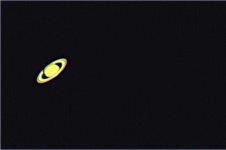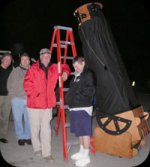CameronBornAndBred
Well-known member
Not astrology, and not looking for y'all that are in the buff. Leos need to keep their loin cloths on.
But...any astronomy folks? I hate math, and astronomy has lots of it. But, I love science, and as a kid I remember going to the Duke surplus store and loading up on lenses to build my own telescopes. Some weren't half bad, but that was a lifetime ago. I've rekindled this passion a bit recently and added a new 8" dobsonian scope to the 4.5" equatorial mount reflector that I've had.
Long story short, girlfriend and I love looking through the lenses, but capturing much with my phone isn't easy, and while my DLSR camera works well on my EQ mount, it's way too heavy for my dob.
So I bought an entry level cam that slips right into my lens housing. I was excited, but also leery. I take pride in the fact that I'm not blind yet (getting closer, though!), so while I enjoy what I see through my scopes, I wasn't too optimistic about getting the box promised images that I was looking at when I ordered.
Now I'm totally geeking out, eager to learn how to actually use both the camera and the software that bundled with it. Youtube is my teacher for each.
These are shots I took tonight. Each is "stacked" images from video files that I recorded through my 8" dobsonian.


Obviously Saturn is at the top, Jupiter is below. Jupiter is color corrected with Photoshop.
Any other night sky buffs here? I'm looking forward to heading to Staunton River State Park in Va in a few weeks. We go up for their "dark sky" nights once or twice a year. They have a huge field, and lots of other folks out with some scopes that will literally dwarf you.
But...any astronomy folks? I hate math, and astronomy has lots of it. But, I love science, and as a kid I remember going to the Duke surplus store and loading up on lenses to build my own telescopes. Some weren't half bad, but that was a lifetime ago. I've rekindled this passion a bit recently and added a new 8" dobsonian scope to the 4.5" equatorial mount reflector that I've had.
Long story short, girlfriend and I love looking through the lenses, but capturing much with my phone isn't easy, and while my DLSR camera works well on my EQ mount, it's way too heavy for my dob.
So I bought an entry level cam that slips right into my lens housing. I was excited, but also leery. I take pride in the fact that I'm not blind yet (getting closer, though!), so while I enjoy what I see through my scopes, I wasn't too optimistic about getting the box promised images that I was looking at when I ordered.
Now I'm totally geeking out, eager to learn how to actually use both the camera and the software that bundled with it. Youtube is my teacher for each.
These are shots I took tonight. Each is "stacked" images from video files that I recorded through my 8" dobsonian.


Obviously Saturn is at the top, Jupiter is below. Jupiter is color corrected with Photoshop.
Any other night sky buffs here? I'm looking forward to heading to Staunton River State Park in Va in a few weeks. We go up for their "dark sky" nights once or twice a year. They have a huge field, and lots of other folks out with some scopes that will literally dwarf you.

